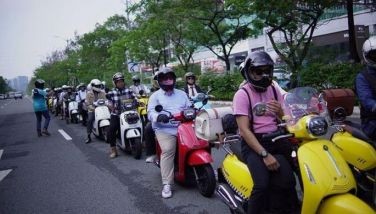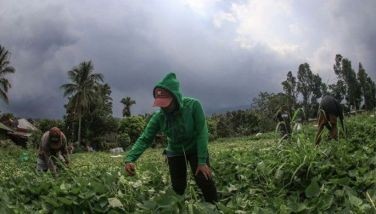Breaking the Glass Ceiling
May 8, 2002 | 12:00am
 He stopped dreaming of ever becoming president of an automotive company in the country five years ago. He knew he could never make it; the glass ceiling for Filipino executives, he realized, was just too thick for him or any Filipino to crack.
He stopped dreaming of ever becoming president of an automotive company in the country five years ago. He knew he could never make it; the glass ceiling for Filipino executives, he realized, was just too thick for him or any Filipino to crack.
But destiny is something no one can stop. Henry Co, well-trained and highly-disciplined that he is, was obviously destined to become something great.
Co has just been named president of Ford Philippines after working in the company for only four years. At 47, he holds the distinction of being the first and only Filipino employee to rise to the top of a multinational car company in this part of the world.
In his speech at a getting-to-know-you party at a Makati hotel last month, the highest-ranking Filipino in the Ford world joked that he resigned from the automotive industry in 1997 because his wife Lucy was earning more money selling ice cream than he did making cars.
Seriously, he quit Nissan Motors Philippines Inc. then after he realized there was no more rung in the corporate ladder for him to climb. He had been in the company for 15 years and it suddenly dawned on him that he could never become president no matter what he did.
"I realized that there was this large glass ceiling spread across the whole auto industry beyond which Filipino professionals just could not break through," he said.
Being the top Filipino in the company, he got himself a well-appointed office at the plant. But his first day at his new office only made him realize that he was headed for a dead end.
"The first time I went into my office, the reality dawned on me. This is where I will be spending the rest of my life in this company if I decide to stay. So I decided to quit and do something else. I told myself, if I cannot make it to the presidency of Nissan, I know no other Filipino can."
As said earlier, destiny was part of the reason why Co is now on top of Ford in this country. His being Japanese-educated was a major factor in his being hunted by Ford.
Co earned his college degree through a scholarship in Japan. That, too, was never planned. He was studying engineering at the University of the Philippines when a friend told him about a scholarship offer. "It was my friend who was the one interested. I just went with him. It turned out that I passed the exam and he failed," he recalled.
It was also in Japan – at the Tokyo Institute of Technology – where Co got his masters in engineering degree. However, he never had an inkling of what he wanted to do afterwards. "One of my professors asked me what my plan was after finishing my masters and I said I just want to go back to the Philippines and probably work in a bank just like a brother of mine. My professor almost fainted. ‘What?’ he asked me. ‘You have a masters degree in engineering from Japan and you just want to work in a bank?’ It was that professor who pushed me to go into manufacturing," he said.
As early as 1997, when long-time Ford executive Terry Emrick was tapped to lead the comeback of Ford in the Philippines, Ford’s top honchos in Dearborn, Michigan were already looking forward to the day when key operations of Ford Group Phils. would be headed by Filipinos.
Emrick began scouting for talents even before he touched down in the Philippines. He was in Venezuela and he asked an associate who had been to Manila if he knew some talented people in the local automotive business. He got Co’s name.
"He is a Filipino who thinks just like the Japanese," Emrick recalled what he was told. "If you’ll be doing business in a Japanese-dominated market, you should get this guy."
However, Emrick realized later on that it was hard to convince someone to do something he has already decided to give up. It took him 17 phone calls before Co agreed to meet him. And it took him hundreds of hours in breakfast meetings before Co opened up to consider his offer.
"It was harder to court Henry than to court my own wife," Emrick said.
Co, apparently, was all too convinced that the automotive business was finished for him. If ever he would go back to the industry, he wanted to be sure that the playing field would be level for him and other Filipinos. He wanted to be sure that he could get a crack at the top post if ever he would aspire for it.
Emrick assured Co that at Ford, the playing field is equal for anyone — Filipinos, Americans, black or white – with big dreams and big desires to excel. But Co proved to be a hard nut to crack. So Emrick had to send Co to Dearborn, Michigan, the home of Ford Motor Company. There, Co met with Wayne Booker, then number two man in the entire Ford hierarchy.
"Wayne Booker assured me that indeed, the playing field here is equal, that I can become president of Ford Philippines if I worked hard enough. It was only then that I accepted the offer," Co recalled.
"Whenever I walk into the plant and see the line workers, I can’t help but think that they are my responsibility now. Their families depend on me and this company. That’s why I have to make sure that this company will remain competitive and profitable," he says.
Exporting cars from the Philippines is, to Co’s mind, the only way to go if a local carmaker is to survive and remain competitive in a globalized market. "We’re ahead of the game. In March we exported 100 cars to Thailand," he said.
At present, the Philippines is importing completely-built units or CBUs from other countries at 20-percent tariff. But starting next year, this tariff will go down to between zero and five percent.
"Starting January, the competition will no longer be between local car makers but between regional brands. Competition will intensify, prices will drop and quality will improve. There will be more choices and the ASEAN consumer will ultimately benefit and the market will grow," he said.
Co hopes that some day other multinational companies would have just as level a playing field for its workers as Ford’s.
"We Filipinos have the natural ability to lead. What we lack are opportunities. That’s what I’m planning to do here at Ford. One of my biggest challenges is to make the company grow fast enough so as to provide more career opportunities to our people," he said.
BrandSpace Articles
<
>
- Latest
Latest
Latest
September 30, 2024 - 4:26pm
By EC Toledo | September 30, 2024 - 4:26pm
September 26, 2024 - 3:30pm
September 26, 2024 - 3:30pm
August 16, 2024 - 11:00am
By Euden Valdez | August 16, 2024 - 11:00am
Recommended





























